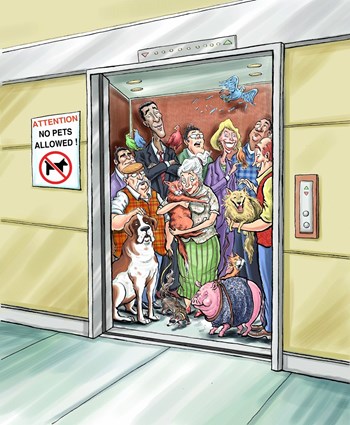
Condo, HOA, and co-op boards are generally made up of volunteers—and they're frequently a pretty diverse group. There’s the stay-at-home mom who’s looking to get involved with something beyond homework and housework. There’s also the young doctor who just moved into the building and immediately took an interest. Or perhaps there's the retired school bus driver who's got a green thumb and delights in chairing the landscaping committee each spring. No matter what their background, most board members share a genuine desire to serve their building community and have a hand in the way it’s governed. What they may not have in common is a firm grasp of the law and the legal implications of their decisions as board members.
Of course, some boards are lucky enough to have a practicing legal professional among them who can give sound advice and guide their decision-making process. Those not so fortunate may take a more laissez-faire approach to decision making—which may seem a more friendly, collegial way to run things, but which can lead to serious and unforeseen headaches in the long run.
For example, if an association or building has had a no-pets rule for years, and all of a sudden the rules are bent—rather than changed officially and through proper channels—to allow a resident to harbor a pet can cause major headaches.
Tony Nardone of Dovan Management Group, LLC, in Bloomfield, says, “You'd be surprised how many communities show up at a board meeting to find out that 'the board met and we decided that we're gonna allow dogs.' [In a situation like that] You have to tell them to take a step back. You have to do some kind of due diligence, whether it's a survey in the community. We just had a community recently that did a survey of how many people in the community would like to see dogs. You'd be surprised at how many people say that they purchase in this particular community because there are no dogs. They're elderly people, they don't want to hear dogs barking at all hours of the day and night when the owners are at work. You don't see that insight unless you do some due diligence.”
Or consider the board president who decides to hire his brother for various construction jobs in the building.
“You cannot benefit yourself financially in working for the community. Of course, everybody has a job that volunteers to do something. But you can't be the manager in our community. We have an ethics clause,” says Ellen Stein, board president of Apple Ridge, a condo community in Mahwah.
Stein recounts her experience, “There were three of us that replaced seven people on the board where I live—nine years ago when we replaced them, the first thing we did was do an ethics clause. We didn't have one. That was very important, to set up a strong, defensible, ethical precedent,”she said.
So how do you prevent board members from doing things their own way? Let's take a look.
Rule #1: Know the Rules
Each board member must follow its own rules, especially those spelled out under New Jersey's Condominium Act and “PREDFDA” (New Jersey's Planned Real Estate Development Full Disclosure Act), which outline the laws that govern all community associations in the state. All boards are legally required to follow the procedures set forth in these pieces of legislation. If any board member is unfamiliar with it or unsure of how to interpret it, they should consult with their association's attorney.
Stein says, “We have an attorney on retainer. Every condo should have an attorney because you want to make sure everything that you do is legal. You don't want to ever do anything that is not proper.”
The other main documents that govern co-op and condo living include the certificate of incorporation—and the proprietary lease in the case of co-ops—and the declaration of covenants, conditions and restrictions or CC&R’s for condos, as well as the bylaws and house rules and regulations that govern day-to-day activities in both.
If an issue arises that isn’t covered in these documents, it doesn’t mean that the board as a whole, or an individual board member can simply do what he or she chooses. One of the keys is board interaction with individual unit owners.
Scott Piekarsky, an attorney with Piekarsky & Associates in Wyckoff, urges boards to "be transparent, be open, and have proper resolutions. Conflicts of interest come up often. [Having] policies for resolution, setting high standards, and enforcing them is really the way [to address those conflicts,]" he says.
Rule #2: Know How to Change
(or Create) Them
“What I found is one of the key components [in the] whole decision-making process is having the attorney involved,” says Nardone.
Nardone believes that knowledge of the association's history is key. “A lot of boards will sit and discuss making it a rule change...some of those associations have attorneys who have been with them for a long time and they have the history of the community, even in some cases longer than the management company. The attorney can shed light as to how you got to where you are today.”
Making a change though has to be approached cautiously. Most importantly is knowing how a change can be made.
Piekarsky says that the board must first decide what type of decision they are trying to make. “If a decision is made, who's making the decision, how it's memorialized, it could be something almost indelible, depending upon the type of decision and how it's memorialized,” he says. “For example, if it's a change from the master deed, it's a change from the governing documents, how do we do it? Then we'll say you'll need a vote of a certain percentage. We need then to have a meeting to do the vote, and then to memorialize that vote, ultimately to draft a new amendment to the documents and to record it and distribute it. That's probably the strongest and the most permanent or indelible.”
Indeed, this is the strongest and most permanent of any changes, because an amendment to the governing documents require a 67% or 75% vote (depending on the governing documents) by unit owners to overturn or change an amendment.
Nardone says changes to the rules and regulations require less bureaucracy, “With rules and regulations, in New Jersey you can do a homeowner vote to undo them or overturn them, so that's something that's recognized by law as well.”
In the end, Piekarsky says that most of these decisions that guide or govern the association are made by the board, and as such, “a board is entitled to establish rules and regulations as long as they are reasonable.”
Rule #3. Keep Your Feelings Out of It
Board members are volunteers—people who give up some of their free time to devote to the upkeep and responsibilities of the building—and they each come with a personality and opinions.
Many board members talk of the difficulty in separating personal feelings from the process and the decisions they make. Many board members may or may not recall a circumstance when a board member blatantly set aside fiduciary responsibility in preference for their individual agenda but that doesn’t mean that decisions aren’t influenced.
There’s no doubt that documents and bylaws are amended from time to time based on the personal preferences of a collective board, but that board members really can’t exert their own personal preference. That’s not to say that there aren’t very strong members who serve on weak boards and can influence others, but if they do that they are subject to liability or breach of fiduciary responsibility.
Rule #4: Know the Exceptions
According to Attorney Matthew L. Moodhe, Esq., of the Illinois-based law firm of Kovitz, Shifrin & Nesbit, the board of directors does have the authority to grant exceptions or waivers to rules and policies. “We suggest, however, that the board attempt to be as uniform and consistent as possible, and the reasons behind the exceptions are well-documented and contained,” he says.
Moodhe explains that when another resident comes before the board and asks for an exception to the same or another rule, the board can then say they are selectively enforcing it and they can defend their decision legally.
“Not every set of circumstances are the same,” says Moodhe. “Typical exceptions can be unanticipated family hardships—documented medical or death, for example—those type of exceptions happen all the time.
”Rule #5: Work With an Attorney
Almost everyone who has ever served on a board agrees that working with an attorney is paramount in ensuring that the board follows the letter of the law and protects itself from liability and fiduciary responsibility. But this only works if the board listens to their attorney.
“Part of the problem with [boards] that is, number one, very often, a lot of associations do not consult with their lawyer. Number two, a lot of lawyers will not voice their opinion unless they are specifically asked. So, both of those are deadly in terms of following the documents,” says Dennis Estis, Esq., an attorney with Greenbaum Rowe Smith & Davis, LLP, a law firm based in Iselin. Estis explains that it is a necessity that the board and the attorney communicate with each other and listen to the advice given.
“Over the years I've represented a number of condo associations and generally if they ask me a question and I give them an answer, even if they don't like the answer they will still follow what I have told them as what the document say and what they have to do,” says Estis.
Rule #6 and #7: Vote Out Problem
Members—and Know the
Consequences of Not Doing So
If a board member consistently tries to break or selectively “forget” about the rules, they should not serve or be re-elected. Keeping a loose cannon like this on the board can lead to all kinds of problems—particularly if their behavior is known and acknowledged. Acting in bad faith, or allowing bad faith to persist can have serious legal ramifications, including paying damages out-of-pocket in the event of a lawsuit or criminal investigation.
“There are good boards and bad boards, and people have terms, and I have never seen a board member removed. Usually the community just lives with it, complains about it, but doesn't do anything until that person's term is up,” says Stein.
Rule #8: Get Back on Track
Okay, so your board made an unintentional mistake. Or maybe a previous board made the mistake and your current board wants to get decision-making back on track. Even if you've made or inherited a mess, it’s never too late to start the process of making it right.
“You have to decide if you want to enforce this rule, not enforce it, take it off the books or amend your rules or documents,” says Moodhe. “If a prior board chose not to enforce a covenant or rule, it doesn’t mean a future board can’t do so. If the board intends to enforce a rule, then we suggest that you give your community some advance notice that it wasn’t enforced before, but will be going forward. For anyone who breaks a rule, issue a warning first—not a fine. Take these small steps at the beginning, and then you can fully enforce.”
No matter whether you're a six-unit, walk-up condo or a sprawling suburban HOA, whether your board is thick with attorneys or has no legal experience other than that gained on the job, it's vital to understand that the decisions you make are not just for the here-and-now; their influence may be felt for years to come. That's why it's so vital to follow the rules above—in cooperation with competent legal counsel of course—and remember that today's decisions are tomorrow's precedents.
Lisa Iannucci is a freelance writer and author and a frequent contributor to The New Jersey Cooperator.






Leave a Comment